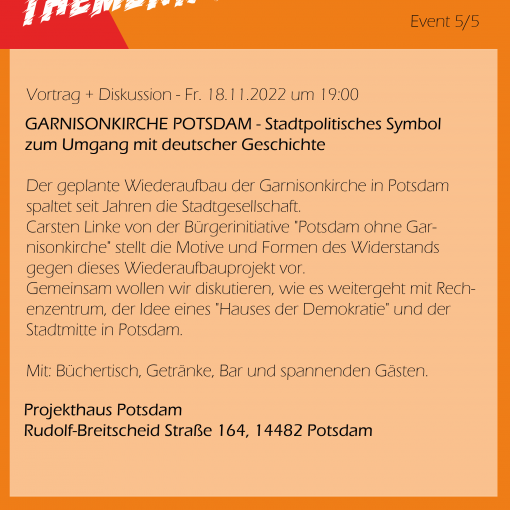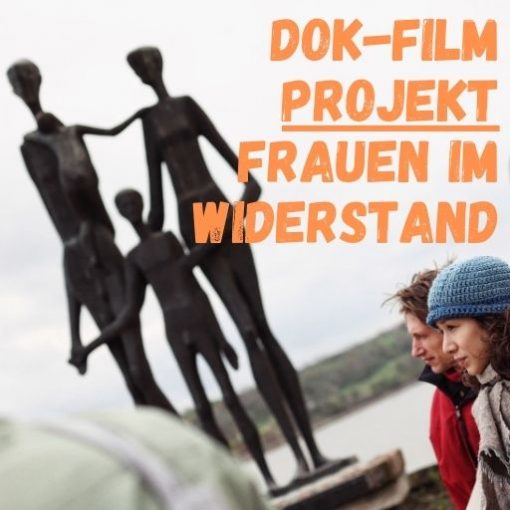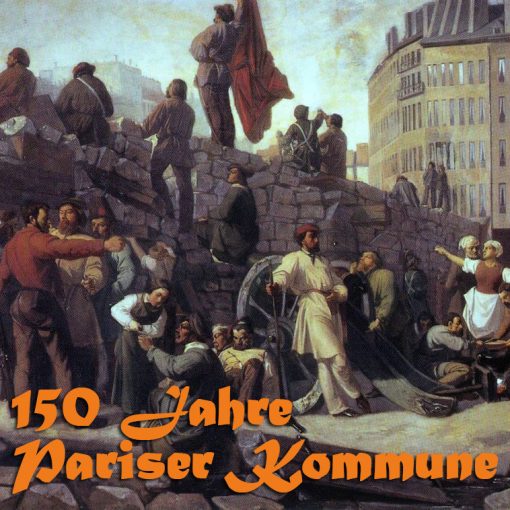Titel: Revolutionserfahrungen
Thema: Exkursionen, zum Teil Fahrradtouren im Rheinland (Elberfeld, Wuppertal), auch Belgien sowie in Potsdam zu Jahrestagen von Revolutionen in der Geschichte (1848/ 1849, 1918/ 1919). Zusammen mit jungen Teilnehmenden aus drei Ländern haben wir Orte revolutionärer Ereignisse besucht, mit Menschen aus der Klimabewegung über Revolutionen heute diskutiert und uns über Max Dortu informiert.
Art: internationale Jugendbegegnungen im Rheinland und Brandenburg
Jahr: 2019
Zeitraum: Juni – November 2019
Teilnehmer:innen: ca. 20 Jugendliche und junge Erwachsene aus Deutschland, Frankreich und Serbien.
Sprache: Englisch, Deutsch, Serbisch
Material: Berichte und Erlebnisse mit Fotos und Dokumentationen, Links und Bücher
Unser Projekt im Überblick:
Revolutionserfahrungen 2019
Das neue Projekt: Revolutionserfahrungen
2019 starten wir ein neues Geschichtsprojekt!
Wir wollen gemeinsam erforschen, erfahren und diskutieren, wann, warum Menschen in Europa Revolutionen gemacht haben!
Egal ob 1789 in Frankreich, 1848/1849 in ganz Europa, in der Novemberrevolution 1918 – überall in Europa haben Menschen gegen Ausbeutung, Ungerechtigkeit und Unterdrückung revoltiert.
Heute können wir davon lernen – in der Klimarevolution, im Kampf gegen Nationalismus und Rassismus: Was trieb Menschen auf die Barrikaden, gegen die gesellschaftlichen Zustände?
Das Projekt hat zwei Teile: Im Juni 2019 fahren wir gemeinsam mit serbischen, französischen und deutschen Jugendlichen ins Rheinland (Revolution 1848/ 1849! und heute: Klimarevolution), im August 2019 treffen wir uns in Potsdam, um Max Dortu zu ehren und die Schwierigkeiten deutscher Revolutionen zu erkunden.
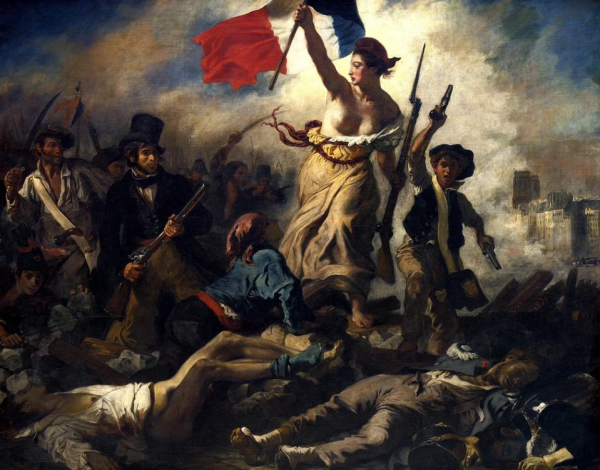
Revolution in Elberfeld 1849
…und Heute?
Am Sonntag, den 23. Juni 2019 waren wir in der Stadt Wuppertal. Eigentlich wollten wir nach Elberfeld, das im 19. Jahrhundert eine
Zentrum der Industrialisierung und der Arbeiterbewegung war. Heute ist Elberfeld ein Stadtteil von Wuppertal – und wie überall im Rheinland gibt
es auch hier nur wenige Zeugnisse der revolutionären Kämpfe der Menschen. Aber 1849 hatten sich hier vor allem Arbeiter*innen gegen das
preußische Militär, für die erste deutsche Verfassung und gegen die Einberufung als Landwehr gewehrt.
“Damals hatte die preußische Regierung und der preußische König Friedrich Wilhelm IV. die Verfassung und die Krone der ersten deutschen
Nationalversammlung, die in Frankfurt tagte, abgelehnt. Bereits am 29.April hatten sich über 1000 Menschen in der Stadt versammelt.
Preußen verhängte den Belagerungszustand und rief die Landwehr ein. Nicht alle Männer folgtem dem Aufruf, denn die Einberufung diente der Unterdrückung
der demokratischen Elemente, die in der Märzrevolution 1848 für die Demokratie gekämpft hatten. 153 Landwehrmänner verweigerten den Gehorsam
und so rückten am 9.Mai 1849 Düsseldorfer Ulanen vom Steinbecker Bahnhof mit zwei Geschützen in die rebellierende Stadt ein. Nach einem ersten
Aufeinandertreffen am Neumarkt zog sich das Militär zurück, in der Stadt wurden Barrikaden errichtet, die größte an der Einmündung Herzogstraße
auf den Wall, gegenüber dem alten Elberfelder Rathaus (hier ist heute das von-der-Heydt-Museum).
Am Abend des 9.Mai 1849 ging das Militär gegen die “Aufständischen” vor, Schüsse fallen. Der preußische Kompaniechef starb, ebenso drei Verfassungstreue: Matthias Buchmüller, ein 38jähriger Tagelöhner, Johann Buschmann, 28 Jahre alter Färber und Wihelm Kranefeld, 45, der von Beruf Schumacher war. Das Militär zog sich zum Laurentiusplatz zurück und verließ am nächsten Tag die Stadt.”, heißt es in einer Chronik.
Wir haben die Denkmäler dazu besucht, welche an die 3 Arbeiter erinnern, die damals erschossen wurden. Mitten in einer Fußgängerzone sind sie leider kaum erkennbar. Warum wird in Deutschland so wenig an Revolutionen gedacht?
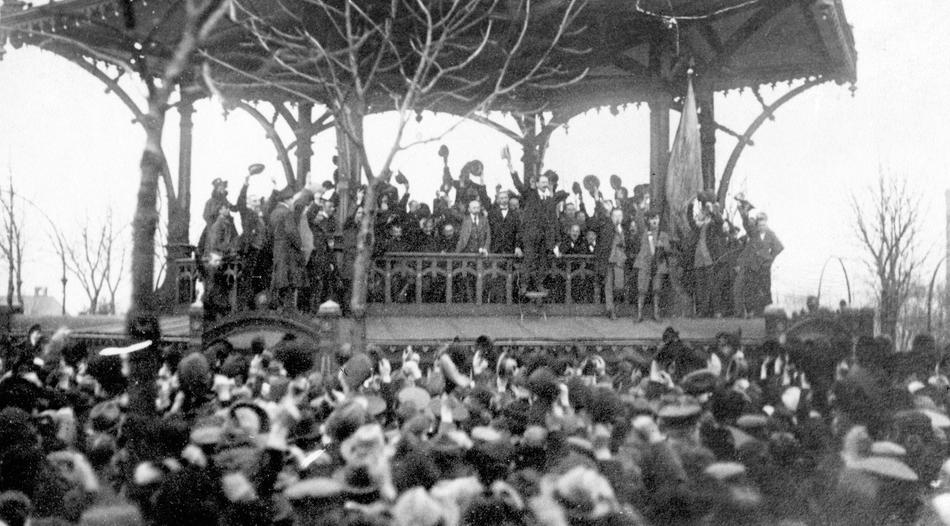
Was andere zu Revolutionen sagen …
Sebastian Haffner „Die Deutsche Revolution 1918/ 1919“
“Noch heute gibt es viele Ebert – Deutsche, die jede Revolution hassen wie die Sünde, noch heute gibt es viele, die die Revolution von 1918 verleugnen wie ein Schandfleck der deutschen Geschichte.

Die Revolution ist kein Schandfleck. Sie war – besonders nach vier Jahren Hunger und Ausblutung – eine Ruhmestat. Ein Schandfleck ist der Verrat, der an ihr geübt wurde.
Gewiss ist Revolution nichts, was man zum Vergnügen macht, gewiss gehört es zur Staatskunst, Revolutionen möglichst durch vorbeugende Reformen zu vermeiden. Jede Revolution ist ein schmerzhafter, blutiger und schrecklicher Vorgang – wie eine Geburt. Aber eine Geburt ist wie jede gelungene Revolution zugleich ein schöpferischer, lebensspendender Vorgang.
Alle Völker, die eine große Revolution durchgestanden haben, blicken mit Stolz auf sie zurück: und jede siegreiche Revolution hat das Volk, das sie zustande brachte, für eine Weile groß gemacht: Holland und England im siebzehnten Jahrhundert ebenso wie in Amerika und Frankreich im achtzehnten und neunzehnten und Russlandund China im zwanzigsten.
Es sind nicht die siegreichen, es sind die erstickten und unterdrückten, die verratenen und verleugneten Revolutionen, die ein Volk krank machen.
Deutschland krankt an der verratenen Revolution von 1918 noch heute.”
2019…Time for another revolution
by Phillip Graf
It the end of august and we got to know Maximilian Dortu in an one and a half hour guided tour in Potsdam about him and his short life of aktive standing up for what he belived was right… and beeing executet for it at the age of 23.
But for me today… and actually the past few years are more about “todays issues”. So when i walk through town i see alot of cigaretts on the ground, plastic wrapping and other rubbish, thats bad for living organisms and for its just a pain in the eye. Pollution in the air, in the ocean, in the streets and seemingly in the hearts, too. Seemingly without interest or concerns people walk by or ignore it and that is in fact scary, isnt it their base of existence thats beeing harmed. Talking about climate change, atomic waste or even palstic. There is a bunch of components threatening not just live of a few humand, but entire species, actually most of animal and nature life as we know it, is about to become extinct, by that suicidal behaviour of humans.
Earlier this year I met some friends of the Potsdammer Projekthaus for the protests against coal digging in Garzwheiler and fossil fueled energy. It was an intense experiance, but for me it was worth it and im willing do more if no action is done. And like two weeks ago, the amazonian rainforest got caught on fire… and it’s still. What does that have to do with revolution? Well, not only do we burn fossil energyresources, but at the same time we decimate on of the few most important ecosystems on earth that can kind of deal with the damage done. The other big part is algea from the ocean, transforming CO² and even those two huge ecosystems are under attac by humans, and i think they can’t take it much longer. Therefore we, as humanity are in need of a big revolution, practically worlwide and instantly. Its not to late, nor ist it acceptable to just give up and not do anything. That wouldn’t be right, taking into consideration, that we have a certain responsibility towards coming generations, not to mention our fellow humans and even more important (if you ask me) our surrounding habitat, nature, which is serving us with nice living conditions.
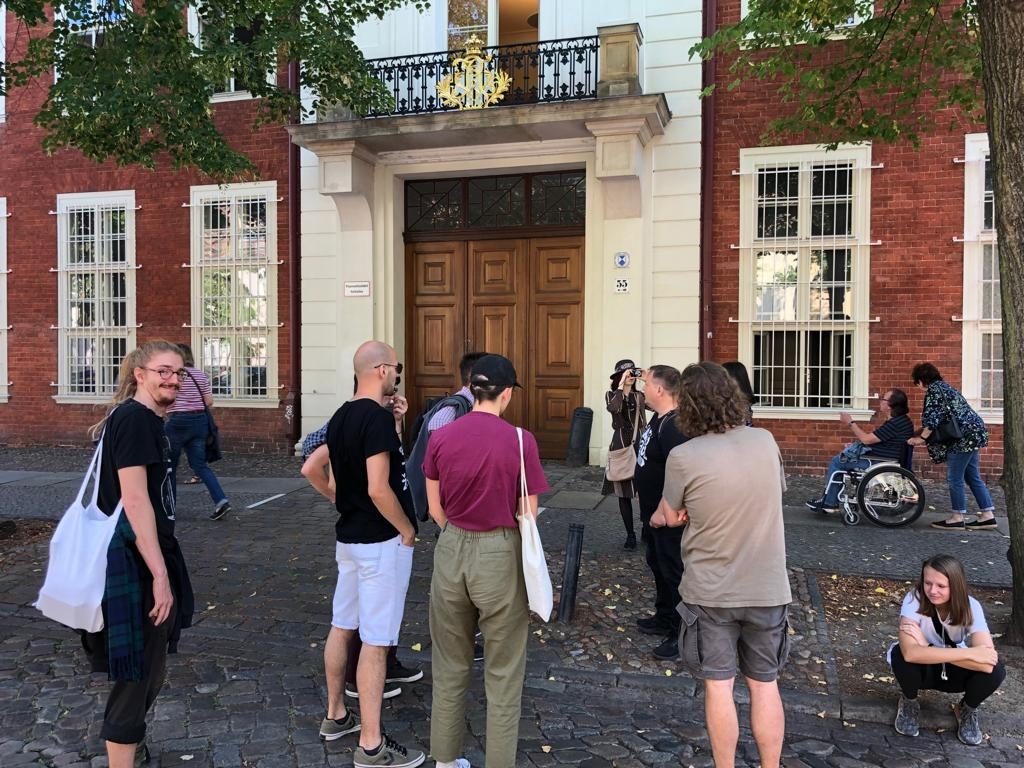
There is so much information on the internet about fakcts and stuff to get involved.
If France with the yellow vests, Hong Kong with their riots, Germany and other countries world wide with FridaysForFuture and friends.
But even for less aktive people, non violent-resistance like boycotting certain roducts would make a big difference. Nestle privatising waterreserves in africa and southamerica, big kapitalistic companies byung and cutting down rainforest (also using fire) and slauthering and blackmailing indigenous people just to create endless rows of monocultered palm oil, GMO soy crops and if the soil is not to use anymore a big mass production place for beef is set up.
The big R’s of zero waste: Refuse, Reduce, Reuse, Recycle, Rot
are a good way to take your responsibilitie for your part in the big circle of life.
And something i keep in mind since a few years now is: I have a big influence in economy and politics if I actively decide who I give my money to, is it a big company paying another big company for their unethical and unecological produced goods? Or is it my local farmer selling me products I might be able to see growing, or maybe a company supporting fair payment and have big quality standarts.
We have enough problems, and there is already enough money and sience and thechnology to resolve them, at the moment the critical mass just lacks of willpower to make the big changes, which have to be quite radical, because we have been waiting for too long and dont have much time left.
revolution english version
Revolution implies the rupture, the abrupt change of paradigm with the above to establish a different system generally more ethical or in conformity with reality. It can be economic, political, scientific, philosophical…
But who decides the revolution? Are there natural revolutions or is it a totally artificial phenomenon?
If we concentrate on the political-economic revolutions, in France the revolutions of 1789 or 1848 were led by leaders of the bourgeoisie, the enlightened elite and it is admitted today that the French Revolution is not originally proletarian but that it was supported and would have been impossible without the subjugated classes.
The bourgeois elite, having invested in it in its own interest, with the aim of annihilating the nobility and imposing the system that would be most advantageous to them: the capitalist republic.
But today it seems that Gavroche has changed his face. For example, the French Yellow Jackets have gone on the street to protest against a rise in the price of gas -which they need if only to go to work- and received virtually no support from the right or left intellectual elite. Are we to see that our intellectual elites have moved to the conservative side or are they afraid to associate with the people? Yet these elites seem necessary to carry out the revolution… But can we really say that Yellow Jackets are revolutionary? Yes and no. The statistics showed that the majority of them had never demonstrated, a large part of them are apolitical and their claim seems at first sight far from revolutionary… But didn’t the people demand bread when Marie-Antoinette told them to eat buns, a few years before the fall of the monarchy? And how can we fail to associate the police repression -denounced by the UN- terrible that fell on the Yellow Jackets and traumatized many of them physically or mentally with the Commune? When systems are in danger and nearing their end, there is almost always a hardening in their doctrine and repression. Isn’t that precisely what’s happening?
Moreover, the Yellow Jackets show a real and deep social frustration and it was this additional tax that served as a spark, as it could have been the previous one or the next. And when they refuse taxes it is not to reduce the weight of the State already badly damaged but to demand a real tax policy that does not suffocate the poorest… However, even if they use the symbols of the revolution, few want a real break, a total change of system.Likewise when young people for the climate mobilize on Fridays they all demand real actions from the politicians and some a change of system but it would be wrong to generalize this will to all the participants.
Change is necessary, however. Social problems such as refugees, famines, war, and deregulated taxation are no longer counted. And especially environmental with air pollution, climate change, melting of the ice -in particular permafrost releasing unknown diseases-, the annihilation of biodiversity…
Faced with all these evils a cause seems to be out of the lot: neoliberalism. It would therefore be a matter of getting out of a political-philosophical-economic system.
In fact, how to deal in such a short time with such great problems without changing the system. Today, globalized neoliberalism leaves no room for humans or any other species. Everything is done to maximize the profits of large multinationals.
Since the 18th century, with the work of Quenay in particular, we know that growth is a finite phenomenon. However, our former capitalist societies are seeing their growth extinguished and are trying by all their means to extricate the last bits of what hardens liberalism and removes social and environmental concerns for more profit. But it is these multinationals that rule the world because neoliberalism has destroyed the role of the state. In addition, their philosophy poisons society in all fields: education, health, transport, culture, research tends to be privatized for lack of means of States when food or information is in the hands of a few powerful people. Certainly remain some independent media and its ethical initiatives in a few areas but how to deal with giants like Amazon who save himself the rights of his employees and the environment when one is a small bookstore for example? So it seems obvious that if we don’t want to sink with this failed economic-political system, we have to get out of it and as soon as possible. But how to deal with a system that encompasses everything? From our everyday life to the way we live our lives and our individual philosophy? To say that time is money is not to admit that we are trapped in this system which tends to make everything profitable? So what other solution than revolution?
But if we agree on the need for a revolution, the question of the afterlife arises. To emerge from neoliberalism, yes but for what then? At the time of globalization it seems necessary to think of the revolution on a global scale… But is it really possible? Even if we agreed on the need for a revolution at the same time political, economic and mentality, which seems difficult to imagine, how can we agree on what should come next, on the dream system? Does it really exist? Should we really ask ourselves these questions? Rousseau had it in mind precisely what the Republic would look like? We can imagine that not.
It is therefore a matter of attacking this system by taking the risk that what comes next may be worse. Keeping in mind that it will not be easy, that perhaps some will lose their lives… But with the hope of a better future.
And how is it possible to take over the economy? So asked this question seems insoluble. But the Bastille insurgents also did not have a specific plan of attack and improvised when the time came…
At first, however, the revolution seems to have to take place on an individual scale. If everyone starts radically changing their habits, acting in harmony with the environment, questioning and questioning the system, perhaps we can hope for an uprising from below, from the basic consumer, from the fifty-year-old housewife. However, this must not make some people say that if the planet goes badly, it is only about individuals. That would be wilfully veiling reality. Blaming a child who buys candy is unfair when you consider the advertisements he eats all the time and plays on cognitive biases. Nor should it lead to a depoliticization of individuals since the system has been in place for so long, we might as well not help it by not going to vote and demand more and more from the state and multinationals. Another extreme would be to adopt the survivalist posture and wait for the system to spit itself out without really knowing what it means and leave the future of humanity in the hands of those who want to enjoy it…




